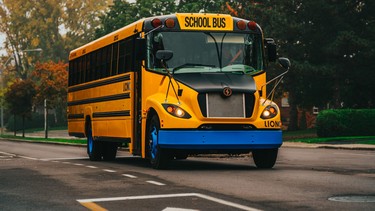Technology
Montreal School Bus Fire Sparks Safety Concerns, Students Safe

A school bus fire occurred earlier this week near Montreal, prompting the immediate evacuation of students without any reported injuries. The incident involved a Lion-C electric school bus, which has since led to the inspection of the entire fleet of these vehicles, numbering around 1,200.
Montreal’s fire department responded quickly to the scene. Alain Laflamme, section chief at the department, confirmed that the fire originated from the bus’s diesel-fired heating system, rather than its electric powertrain. This crucial detail clarifies that the source of the blaze was not linked to the electric vehicle technology itself.
Inspection and Safety Measures Underway
In light of the incident, the City of Montreal has taken proactive measures by recalling all Lion-C electric school buses for inspection. These buses are equipped with an 80,000 BTU heater, which, according to documents, is sourced from common brands. While specific details about the heater involved in this incident remain unclear, the name Valeo has been associated with similar heating systems in other contexts.
The heating system, designed to operate with a fuel tank holding 25 gallons (95 litres) of diesel, has been involved in previous fire-related incidents. The manufacturer’s specifications indicate that there is an emergency stop button for the heating system located near the driver’s left leg, although it is unknown if this was activated during the fire.
Misconceptions About Electric Vehicles
Despite the clarifications surrounding the incident, public reaction has included significant criticism aimed at electric vehicles. Many commentators have expressed concerns over the safety of electric buses, despite evidence indicating that the fire’s origin was due to the heating system, not the electric components. According to Laflamme, the fire was “easily” extinguished, emphasizing the effectiveness of emergency response.
It is important to note that a fire of this nature could occur in any bus, regardless of whether it is electric or powered by traditional internal combustion engines. A conventional school bus can carry up to four times the amount of flammable liquid compared to the diesel used in the Lion-C’s heating system.
The Lion-C buses are designed for performance, featuring a top speed of 95 km/h and a range of approximately 250 kilometres on a single charge of their 210-kWh battery. These buses produce 489 horsepower and 2,100 lb-ft of torque, showcasing their capability for transporting students safely and efficiently.
As the city undertakes inspections, it remains crucial for the public to differentiate between the technology of electric vehicles and isolated incidents related to auxiliary systems. The situation underscores the need for continued dialogue on the safety of all bus types, ensuring that student transportation remains secure.
-

 Education3 months ago
Education3 months agoBrandon University’s Failed $5 Million Project Sparks Oversight Review
-

 Science4 months ago
Science4 months agoMicrosoft Confirms U.S. Law Overrules Canadian Data Sovereignty
-

 Lifestyle3 months ago
Lifestyle3 months agoWinnipeg Celebrates Culinary Creativity During Le Burger Week 2025
-

 Health4 months ago
Health4 months agoMontreal’s Groupe Marcelle Leads Canadian Cosmetic Industry Growth
-

 Science4 months ago
Science4 months agoTech Innovator Amandipp Singh Transforms Hiring for Disabled
-

 Technology4 months ago
Technology4 months agoDragon Ball: Sparking! Zero Launching on Switch and Switch 2 This November
-

 Education4 months ago
Education4 months agoRed River College Launches New Programs to Address Industry Needs
-

 Technology4 months ago
Technology4 months agoGoogle Pixel 10 Pro Fold Specs Unveiled Ahead of Launch
-

 Business3 months ago
Business3 months agoRocket Lab Reports Strong Q2 2025 Revenue Growth and Future Plans
-

 Technology2 months ago
Technology2 months agoDiscord Faces Serious Security Breach Affecting Millions
-

 Education4 months ago
Education4 months agoAlberta Teachers’ Strike: Potential Impacts on Students and Families
-

 Education3 months ago
Education3 months agoNew SĆIȺNEW̱ SṮEȽIṮḴEȽ Elementary Opens in Langford for 2025/2026 Year
-

 Science4 months ago
Science4 months agoChina’s Wukong Spacesuit Sets New Standard for AI in Space
-

 Business4 months ago
Business4 months agoBNA Brewing to Open New Bowling Alley in Downtown Penticton
-

 Business4 months ago
Business4 months agoNew Estimates Reveal ChatGPT-5 Energy Use Could Soar
-

 Technology4 months ago
Technology4 months agoWorld of Warcraft Players Buzz Over 19-Quest Bee Challenge
-

 Business4 months ago
Business4 months agoDawson City Residents Rally Around Buy Canadian Movement
-

 Technology2 months ago
Technology2 months agoHuawei MatePad 12X Redefines Tablet Experience for Professionals
-

 Technology4 months ago
Technology4 months agoFuture Entertainment Launches DDoD with Gameplay Trailer Showcase
-

 Top Stories3 months ago
Top Stories3 months agoBlue Jays Shift José Berríos to Bullpen Ahead of Playoffs
-

 Technology4 months ago
Technology4 months agoGlobal Launch of Ragnarok M: Classic Set for September 3, 2025
-

 Technology4 months ago
Technology4 months agoInnovative 140W GaN Travel Adapter Combines Power and Convenience
-

 Science4 months ago
Science4 months agoXi Labs Innovates with New AI Operating System Set for 2025 Launch
-

 Technology4 months ago
Technology4 months agoNew IDR01 Smart Ring Offers Advanced Sports Tracking for $169










